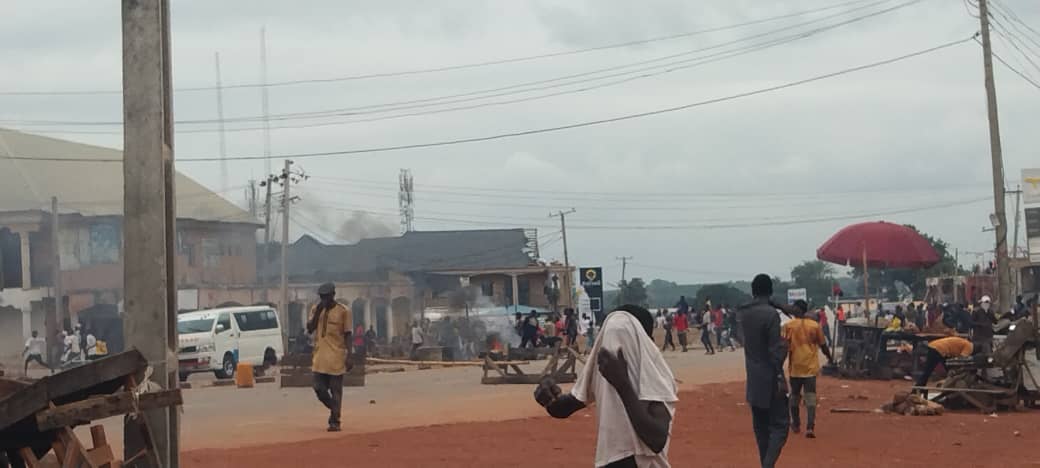Businesses shut in many states
Major markets in several cities across the country were shut on Thursday following the protest against hunger which started on Thursday. Traders in these major markets remained under lock and key as tension built across the country over repeated government warnings that it had uncovered plans by miscreants to hijack the planned hunger protest. In […]

protest 9
Major markets in several cities across the country were shut on Thursday following the protest against hunger which started on Thursday.
Traders in these major markets remained under lock and key as tension built across the country over repeated government warnings that it had uncovered plans by miscreants to hijack the planned hunger protest.
In Lagos, markets such as Idumota, Tejuosho, Mile 12, Trade fair, and Alaba International were shut over fears that the activities of hoodlums were taking advantage of the protest to vandalise shops.
At Ladipo market, which is known for spare parts, Computer Village in Ikeja, shops were also closed.
- Security operatives battle protesters in Gwagwalada
- Day one of protest: Deaths, destruction in some states
In Abuja, Wuse market, Wuye, Garki, Utako and other smaller markets in the area councils also remained shut.
Similarly, In Kano, major markets in Sabon Gari, Katin Kwari, Singa, Kasuwar Rimi were also shut.
In Enugu, Economic activities were paralyzed in Enugu as Banks, petrol stations, eateries and markets were deserted as most residents remained indoors.
The situation was replicated across several states of the federation.
In a chat with Daily Trust, Chairman of the Nigeria Labour Congress, NLC, Kwara State chapter, Comrade Saheed Mustapha Olayinka, said “We are not part of the protest, but the government should make the four refineries functional and address the flow of the naira.
Seaports, airlines operate skeletal services
Two of the nation’s busiest seaports, the Apapa and Tin-Can Ports, were open but clearing agents stayed away for fear of being caught at the event of possible breakdown of law and order.
Officers of the Nigeria Customs Service were at the duty post in both ports, but all the banks were closed.
Only some food vendors, some of whom reside nearby, were seen around, while the entire Mile 2 – Apapa expressway was totally deserted.
It was learnt that those who came were forced to close their shops early.
This was even as customs officers and members of the Maritime Workers Union of Nigeria (MWUN) had earlier assured that they would be ready to be at the ports for work.
Subaru Abdul, a clearing agent, told our correspondent that it would be risky to take delivery of containers and be on the road at a time of protest because of criminal elements.
“Although there is heavy presence of the police and soldiers, hoodlums can take advantage of the protest to unleash mayhem,” he said.
A source said many people want to first watch the situation before going for business or work.
There were also skeletal operations at the Murtala Muhammed International Airport (MMIA) in Lagos and many airports across the country.
Our correspondent reports that though airports remain open despite the protest, there were few flights that operated yesterday.
Sources said the development was due to the tension generated by the protest with many people staying at home.
At the Murtala Muhammed Airport terminal two (MMA2), only about four flights had been operated when our correspondent checked.
Daily Trust reports that Lagos-Enugu flight was boarding as of press time; also, Max Air flight VM 1604 arrived from Kano.
A source who spoke to our correspondent said the protest slowed down activities at the airport even though the airports across the country remained open.
“This was why you saw few aircraft at the domestic airport in Lagos on Wednesday night,” an airport official said under strict anonymity.
Max Air cancels Friday’s flights
Due to unrest in some states, it was learnt that Max Air has taken the decision to cancel its flights.
“Our flights for tomorrow should be cancelled until the situation changes. We are making a statement that due to the unrest in various states, we are cancelling our flights. Our customers should contact customer service for when flights will resume in your city,” it said.
Stakeholder projects N15bn loss in travel industry
Group CEO of Wakanow, Bayo Adedeji, stated that the protest could cost the Nigerian travel industry up to N15 billion in daily transactions.
Adedeji in an interview monitored on Channels stated that the impact on cancellations could be significant if all airlines are unable to operate during the protest.
“We are concerned about airline cancellations. The impact on the industry and economy is big. If all airlines cancel flights, think about the financial losses,” he said.
Adedeji added, “Some international airlines have quotas. If the protest causes you to miss or cancel your flight, you will pay cancellation fees. We are working on this.”
Regarding projected financial losses, he said, “To my industry, we have a daily rate of N4-5 billion for agencies. For the aviation industry, a delayed sale of about N10 to N15 billion daily means transactions worth N15 billion will not be used or consumed as services paid for. So, the N15 billion transaction dominos to the next day. It is a real loss. In retail, a sale that does not happen is a loss, so it affects both the service provider and consumer.”
CPPE projects daily N400bn loss
An economist and Chief Executive Officer of the Centre for the Promotion of Private Enterprises (CPPE), Dr Muda Yusuf, had earlier cautioned that the nationwide protest against hunger and bad governance portends “grave dangers for an economy which is already in a very fragile state.”
“The protests could inflict an estimated daily loss of N400 billion, if not properly managed,” Yusuf projected.
He however begged the organiser to shorten the protest duration to one day to reduce the impact on small businesses and those in the informal sector who depend on daily income.
